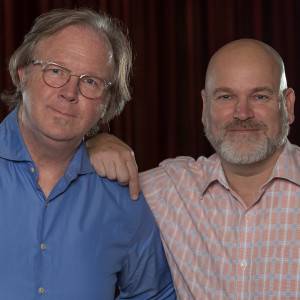
Stories, science and secrets from the world’s brightest thought-leaders. Behavioral Grooves is the podcast that satisfies your curiosity of why we do what we do. Explanations of human behavior that will improve your relationships, your wellbeing, and your organization by helping you find your groove.
Episodes

Sunday Nov 10, 2019
Chris Brown: Avalanches and System 1 Thinking
Sunday Nov 10, 2019
Sunday Nov 10, 2019
Chris Brown is in human risk management and practice is set in backcountry snow. He grew up outside of Philadelphia and after graduating with a degree in Urban Design/Architecture, he moved to Utah to pursue certification with the AMGA (American Mountain Guides Association) in avalanche training.
Chris works as a ski guide and avalanche/snow science professional, but his real job is helping skiers overcome their biases. He incorporates the work of Kahneman and Tversky, Richard Thaler and other great researchers into his classes and we found his intentionality in decision making noteworthy.
We had a great conversation with Chris and we also want to express our gratitude to friend and colleague, Ben Granlund, for connecting us with Chris. Ben attended one of Chris’ classes and found it so engaging that he referred us to Chris. Ben was also delighted that Chris relies heavily on behavioral science and reminds us that the biggest threat to your life in avalanche country is your own decision making.
After our recording stopped, we discussed Guide Services for training. If you are interested, check out AMGA (amga.com) and the American Avalanche Association: https://www.americanavalancheassociation.org/
Links
Chris Brown Email: chrisbr862@gmail.com
Chris Brown Instagram: https://www.instagram.com/cbskiclimb/
Ian McCammon: https://www.youtube.com/watch?v=xKeoF53syKw
Phil Tetlock “Super Forecasters”: https://www.youtube.com/watch?v=rV5Gicb66WA
Familiarity Bias: https://en.wikipedia.org/wiki/Familiarity_heuristic
Expert Halo: https://en.wikipedia.org/wiki/Halo_effect
System 1 / System 2: https://en.wikipedia.org/wiki/Thinking,_Fast_and_Slow
Premortem: https://en.wikipedia.org/wiki/Pre-mortem
Bruce Tremper: https://backcountrymagazine.com/stories/video-avalanche-expert-bruce-tremper-risk/
Bayesian Decision Making: https://wiki.lesswrong.com/wiki/Bayesian_decision_theory
First Tracks: https://www.boston.com/culture/ski-guru/2012/01/31/its_all_about_f
Laurence Gonzales “Deep Survival”: https://www.youtube.com/watch?v=QTyfvOrEm1w
Wicked Learning Environments: https://pdfs.semanticscholar.org/5c5d/33b858eaf38f6a14b3f042202f1f44e04326.pdf
Daniel Kahneman: https://en.wikipedia.org/wiki/Daniel_Kahneman
The Tao of Wu: https://en.wikipedia.org/wiki/The_Tao_of_Wu
Kurt Nelson: @motivationguru
Tim Houlihan: @THoulihan
Musical Links
Hip Hop: https://en.wikipedia.org/wiki/Hip_hop
Reggae: https://en.wikipedia.org/wiki/Reggae
Classical Music: https://en.wikipedia.org/wiki/Classical_music
Death Metal: https://en.wikipedia.org/wiki/Death_metal
Steel Pulse: https://steelpulse.com/
Wu Tang Clan: https://www.youtube.com/watch?v=PBwAxmrE194
MadLib: https://www.stonesthrow.com/madlib
Gang Starr: https://www.rollingstone.com/music/music-news/gang-starr-guru-bad-name-video-909996/
John Coltrane: https://www.youtube.com/watch?v=EH3mb3oXCpw
Marcus Miller: https://www.youtube.com/watch?v=1kCi-SsYD5s
Stanley Clarke: https://www.youtube.com/watch?v=mcuigwtdzS4
Bela Fleck: https://www.youtube.com/watch?v=WWIfFIEeZjw
Victor Wooten: https://www.youtube.com/watch?v=EzL4BkqmzDQ
Herbie Hancock: https://www.youtube.com/watch?v=GHhD4PD75zY

Saturday Nov 02, 2019
Zarak Khan and Erik Johnson: Action Design Network and Beyond
Saturday Nov 02, 2019
Saturday Nov 02, 2019
Sometimes things just go better in twos and that was the case regarding our guests for this episode. Zarak Kahn is the Behavioral Innovation Director at Maritz and Erik Johnson is an independent Behavioral Science Consultant. They are the co-hosts of Action Design Radio and board members at Action Design Network. Kurt and Tim have known them as coaches and colleagues and wanted to talk to them about all of that.
We discussed how the application of behavioral science continues to grow in both the corporate and policy words. Today, there are more jobs, more workshops, more bachelor's programs, more masters programs, more PhD programs, more meetups and more bootcamps than ever before. We expressed our collective desires to make behavioral science so easy to do it will be ingrained into every job from UX to Marketing to HR, and how we’d like to see people applying a behavioral lens in all of their decision-making.
In our grooving session, Kurt and Tim emphasized the importance of expanding the community of people applying behavioral science and we are grateful to share the mantle with very bright and fine folk like Erik and Zarak.
Links
Erik Johnson Twitter: https://twitter.com/erikleejohnson
Erik Johnson LinkedIn: https://www.linkedin.com/in/erikleejohnson/
Erik Johnson Website: erikj.net
Zarak Kahn LinkedIn: https://www.linkedin.com/in/khanzarak/
Action Design Network: http://www.action-design.org/
Action Design Radio (podcast): https://actiondesignradio.libsyn.com/
Robert Cialdini: https://en.wikipedia.org/wiki/Robert_Cialdini
Dan Kahneman: https://en.wikipedia.org/wiki/Daniel_Kahneman
Richard Thaler: https://en.wikipedia.org/wiki/Richard_Thaler
Cass Sunstein: https://en.wikipedia.org/wiki/Cass_Sunstein
Musical Links
Idles: https://www.youtube.com/watch?v=BuQG6_evFc8
Local Natives: https://en.wikipedia.org/wiki/Local_Natives
Lana Del Rey: https://lanadelrey.com/
Carley Rae Jepson: https://www.youtube.com/watch?v=fWNaR-rxAic
Wye Oak “The Louder I Call the Faster it Runs”: https://www.youtube.com/watch?v=kO7ffikJOE4
Sylvan Esso: http://www.sylvanesso.com/
Johnny Flynn: https://en.wikipedia.org/wiki/Johnny_Flynn_%26_The_Sussex_Wit
Sharon Van Etten: https://www.youtube.com/watch?v=j7sTHoeH0eA
Gillian Welch: https://www.youtube.com/watch?v=sJ_nWPxrzmE
M Ward: https://mwardmusic.com/
The National: https://www.youtube.com/watch?v=yIWmRbHDhGw

Sunday Oct 27, 2019
Victoria Shaffer: End of Life Decision Tools
Sunday Oct 27, 2019
Sunday Oct 27, 2019
Victoria Shaffer is a researcher and professor at the University of Missouri. Victoria focuses on applying decision psychology and behavioral economics to medical decision making. In particular, she is researching judgment and decision making and how they impact the design of patient decision support tools.
Tim and Victoria met working on a field research project with Dan Ariely, PhD because of her work on non-monetary rewards with Scott Jeffrey, PhD. She was pushing back on common sense preferences, such as money is the best motivator, just as she is today with her work in the medical field.
Our conversation with Victoria began on familiar ground: the preference for cash as a reward and how it’s actually less effective than non-monetary rewards in incentive schemes. But we soon turned to the very personal journey of how she and her mother dealt with decisions surrounding her father’s diagnosis with cancer. Her personal journey became the foundation for important research to help patients, their loved ones and the caregivers communicate more effectively through stories.
It’s a fascinating discussion and we hope you enjoy it.
Links
Victoria Shaffer: https://psychology.missouri.edu/people/shaffer
Shelly Taylor on Biases and Mental Health: http://humancond.org/_media/papers/taylor_brown_88_illusion_and_well_being.pdf
Hal Arkes: https://psychology.osu.edu/people/arkes.1
Decision Support Tools: https://www.healthit.gov/topic/safety/clinical-decision-support
“Being Mortal” by Atul Gawande: http://atulgawande.com/book/being-mortal/
MD Anderson Cancer Center: https://www.mdanderson.org/
Advance Directives: https://www.nia.nih.gov/health/advance-care-planning-healthcare-directives
Palliative Care: https://getpalliativecare.org/whatis/
Peter Ubel – Duke: https://www.fuqua.duke.edu/faculty/peter-ubel
Affective Forecasting Errors: https://en.wikipedia.org/wiki/Affective_forecasting
Columbia Records: https://en.wikipedia.org/wiki/Columbia_Records
Dan Gilbert: https://en.wikipedia.org/wiki/Daniel_Gilbert_(psychologist)
Kurt Nelson, PhD: https://www.linkedin.com/in/kurtwnelson/
Tim Houlihan: https://www.linkedin.com/in/tim-houlihan-b-e/
Music
Van Halen: https://www.youtube.com/watch?v=9X6e7uctAww
Black Sabbath: https://www.youtube.com/watch?v=5s7_WbiR79E
Ozzy Osbourne: https://www.youtube.com/watch?v=wtHEN518VCM
Styx: https://www.youtube.com/watch?v=5XcKBmdfpWs
Depeche Mode: https://www.youtube.com/watch?v=diT3FvDHMyo
The Cure: https://www.youtube.com/watch?v=hXCKLJGLENs
Crosby, Stills, Nash & Young: https://www.youtube.com/watch?v=UQ9NaqjeDGU
James Taylor: https://www.youtube.com/watch?v=sWGK_fWKb4U

Sunday Oct 20, 2019
Grooving: UPenn Norms and Behavioral Change Workshop
Sunday Oct 20, 2019
Sunday Oct 20, 2019
Kurt and Tim were invited to attend the Norms and Behavioral Change (NoBeC) workshop at the University of Pennsylvania on October 17 and 18, 2019, and what we experienced blew us away. We were impressed with a terrific diversity of academic fields studying social norms, the great work they are doing, and the generosity of the community (at UPenn as well as the behavioral science researchers from around the world).
This gathering was very different from industry assemblies we’ve attended, which in and of itself was not a surprise. However, there were three noteworthy differences. First, the lineup of speakers was heavily weighted toward researchers with findings on projects involving social norms. Second, academic audience members held speakers accountable for rigorous processes and the descriptions of their results. Lastly, the Q&A at the end of each presentation was filled with animated questions from economists, behavioral economists, sociologists, political scientists, philosophers, strategists, law professors, and of course, psychologists. The cross-disciplinary aspect of this group reinforced the need for more diverse thinking in the business world.
We came away with a greater appreciation of the role that social norms play in our behaviors and decision making as well as the tremendous research that’s being conducted on related topics.
We will be publishing our series of interviews with researchers from the workshop in the coming weeks, and we hope you enjoy them as much as we did.
Links
University of Pennsylvania Master of Behavioral and Decision Sciences: https://www.sas.upenn.edu/lps/graduate/mbds

Sunday Oct 13, 2019
Paul Hebert: 7 Deadly Incentive Sins
Sunday Oct 13, 2019
Sunday Oct 13, 2019
Paul Hebert knows incentives. He is the Vice President of Individual Performance Strategy at Creative Group, Inc. and a writer, speaker and consultant and is widely considered an expert on motivation and incentives focused on influencing behaviors that drive business results. Paul has been interviewed by the BBC and USA TODAY because of his work applying solid psychological theory to sales motivation.
Paul, Kurt and Tim recently co-authored an eBook called “The 7 Deadly Sins to Avoid in Your Next Sales Incentive.” The purpose was to help sales managers who are struggling to maximize their effort and results when they use sales incentives. In the podcast, we recap the most common sins committed by sales managers and discuss ways of avoiding them.
- Spread goals evenly
- Give a huge prize to the top performer
- Must be above quota to earn
- We’ll figure it out behind the scenes
- Under-quota performers can’t be winners
- It’s all about the Benjamins
We hope you enjoy the discussion and recommend you download the eBook for reference.
Links
Paul Hebert: https://www.linkedin.com/in/paulhebert/
7 Deadly Sins Ebook: https://hubs.ly/H0kR8g60
Paul Hebert’s Blog: http://wphebert.com
Fistful of Talent Blog: http://fistfuloftalent.com/author/paulhebert
Elliot Aronson, PhD: https://en.wikipedia.org/wiki/Elliot_Aronson
Zeno of Citium: https://en.wikipedia.org/wiki/Zeno_of_Citium
Steenburgh and Ahearne “Motivating Salespeople”: https://hbr.org/2012/07/motivating-salespeople-what-really-works
Ariely and Heyman “A Tale of Two Markets”: https://journals.sagepub.com/doi/abs/10.1111/j.0956-7976.2004.00757.x?journalCode=pssa
Jeffrey and Shaffer “The Effects of Tangible Rewards”: https://theirf.org/research/the-effects-of-tangible-rewards-versus-cash-rewards-in-a-sales-tournament-a-field-experiment/1638/
The guy who traded a paper clip for a house: https://en.wikipedia.org/wiki/One_red_paperclip
The Price is Right: https://en.wikipedia.org/wiki/The_Price_Is_Right
Estonia: https://en.wikipedia.org/wiki/Estonia
Musical Links
“Eve of Destruction” by Barry McGuire: https://www.youtube.com/watch?v=qfZVu0alU0I
“Timothy” by The Bouys: https://www.youtube.com/watch?v=DGNdvKvbxYQ
“DOA” by Bloodrock: https://www.youtube.com/watch?v=6WQptxygSM8
First Avenue: https://first-avenue.com/
Trip Shakespeare: https://www.youtube.com/watch?v=7PvyrRupOf0
Trip Shakespeare “The Slacks” https://www.youtube.com/watch?v=wkOepnPJS3o
Dan Wilson: https://en.wikipedia.org/wiki/Dan_Wilson_(musician)
Tragically Hip: https://www.youtube.com/watch?v=XN25TcN--I8
Morphine: https://en.wikipedia.org/wiki/Morphine_(band)
Lucius: https://www.youtube.com/watch?v=4QSF8bgqgC4
Semisonic: https://www.youtube.com/watch?v=xGytDsqkQY8
Trampled by Turtles: https://www.youtube.com/watch?v=PcoPedyXJVc
And the Professors: https://www.youtube.com/watch?v=0kxiVQI3XeA
The Mighty Pines: https://www.youtube.com/watch?v=yHrR8LhTKfo
Ewert & the 2 Dragons: https://www.youtube.com/watch?v=ddCsOTWz7gI

Wednesday Oct 09, 2019
Grooving: On Goals
Wednesday Oct 09, 2019
Wednesday Oct 09, 2019
Goals are often misunderstood. Goals are much more than just objectives that are handed down to subordinates. Rather, goals are self-determined in the best cases, and at the very least, are set collaboratively to get the most out of them.
We discuss Goal Setting Theory (GST), results from research that Tim conducted, and we address the three key elements that must be included to maximize the effect of the goals: 1. The goals must be perceived as achievable. Without perceived achievability, the goal is not accepted and, therefore, not a goal. 2. There must be some involvement with those who are executing the goals. If the goal is handed down from on high without meaningful participation from the person who’s going to act on it, it’s not a goal. 3. There must be a positive relationship between the goal and the reward (including a perceived assessment of risk). As the risk of achievability increases, so must the perceived value of the reward.
This short grooving session also delves into some myths and how to deal with them. Ultimately, we want listeners to come away with a clear understanding of the powerful results than can be obtained with practical and effective use of self-selected goals.
Links
Zig Ziglar: https://en.wikipedia.org/wiki/Zig_Ziglar
Goal-Setting Theory: https://en.wikipedia.org/wiki/Goal_setting
Edward Locke: https://peakon.com/us/blog/future-work/edwin-locke-goal-setting-theory/
Gary Latham: http://www.rotman.utoronto.ca/FacultyAndResearch/Faculty/FacultyBios/Latham
Howard Klein: https://fisher.osu.edu/people/klein.12
Ran Kivetz: https://www8.gsb.columbia.edu/cbs-directory/detail/rk566
George Loewenstein: https://www.cmu.edu/dietrich/sds/people/faculty/george-loewenstein.html
Saurabh Bhargava: https://www.cmu.edu/dietrich/sds/people/faculty/saurabh-bhargava.html
Raghuram Bommaraju: https://www.isb.edu/faculty-research/faculty/directory/bommaraju-raghuram
Raghuram Bommaraju & Sebastian Hohenberg on self-selected goals: https://journals.sagepub.com/doi/abs/10.1509/jm.17.0002
Kurt Nelson, PhD: kurt@lanterngroup.com
Tim Houlihan: tim@behavioralchemy.com

Sunday Oct 06, 2019
Brad Shuck: Being Ignored is Worse Than Having a Stapler Thrown at You
Sunday Oct 06, 2019
Sunday Oct 06, 2019
Brad Shuck, PhD is an Associate Professor in the Department of Educational Leadership, Evaluation, and Organizational Development at the University of Louisville. He is also recognized as one of the world’s most knowledgeable experts on employee engagement and is a sought-after speaker from around the world.
Brad’s work is recognized as some of the most influential research in the field of employee engagement and his insights are invaluable. On top of that, Brad is a drummer, a lover of all sorts of music and our discussion traversed topics from the social determinants of health to having parents that were patient enough to allow him to learn drums as a child.
In our grooving session, Kurt and Tim dive deeper into creating a work culture of meaning and we ask the musical question: how does moving from town to town as a child impact your musical tastes?
And don’t forget to join us for our 100th Episode Celebration on October 17, 2019 in Philadelphia! Eventbrite link: https://www.eventbrite.com/e/behavioral-grooves-100th-episode-event-tickets-73159537145
Links
Brad Shuck email: drbshuck@gmail.com
Brad Shuck web page: www.drbshuck.com
Brad Shuck Google Connection: @drbshuck
Teresa Amabile: https://www.hbs.edu/faculty/Pages/profile.aspx?facId=6409
Brad’s Research
- Shuck, B., Alagaraja, M., Immekus, J., Honeycutt, M., & Cumberland, D. (2019). Does compassion matter for leadership: a two-stage sequential equal status mixed method exploratory study of compassionate leader behavior and connections to performance in human resource development. Human Resource Development Quarterly, X, XX-XX. doi: 10.1002/hrdq.21369
- Shuck, B., Peyton-Roberts, T., Zigarmi, D. (2018). Employee perceptions of the work environment, motivational outlooks, and employee work intentions: An HR practitioner’s dream or nightmare? Advances in Developing Human Resources, 20, 197-213. doi: 10.1177/1523422318757209
- Shuck, B., #Osam, K., Zigarmi, D., & Nimon, K. (2017). Definitional and conceptual muddling: Identifying the positionality of employee engagement and defining the construct. Human Resource Development Review, 16, 263-293. doi: 0.1177/1534484317720622
- Shuck, B., Nimon, K., & Zigarmi, D. (2017). Untangling the predictive nomological validity of employee engagement: Decomposing variance in employee engagement using job attitude measures. Group and Organizational Management. 42, 79-112. doi: 10.1177/1059601116642364
- Shuck, B., Alagaraja, M., Rose, K., Owen, J., #Osam, K., & Bergman, M. (2017). The health-related upside of employee engagement: Exploratory evidence and implications for theory and practice. Performance Improvement Quarterly, 30, 165-178. doi: 10.1002/piq.21246
- Shuck, B., Adelson, J., & Reio, T. (2017). The employee engagement scale: Initial evidence for construct validity and implications for theory and practice. Human Resource Management, 56, 953-977. doi: 10.1002/hrm.21811
- Rose, K., Shuck, B., #Twyford, D., & Bergman, M. (2015). Skunked: An integrative review exploring the consequences of dysfunctional leaders and implications for the employees who work for them. Human Resource Development Review, 14, 64-90. doi: 10.1177/1534484314552437
Musical Links
Folk Music: https://en.wikipedia.org/wiki/Folk_music
A Lion Named Roar: http://www.alionnamedroar.com/
Mumford & Sons: https://www.mumfordandsons.com/
For King and Country: https://en.wikipedia.org/wiki/For_King_%26_Country_(band)
John Coltrane: https://www.youtube.com/watch?v=EH3mb3oXCpw
Rodd Stewart: https://www.rodstewart.com/

Sunday Sep 29, 2019
Jim Guszcza: Data Science AND Behavioral Science, New Wine in a New Bottle
Sunday Sep 29, 2019
Sunday Sep 29, 2019
Jim Guszcza is the chief data scientist at Deloitte Analytics. His title paints a picture that he’s a total numbers geek. And that would be a fair, but single-dimensional assessment. What it doesn’t speak to is Jim’s passion for behavioral science and, more importantly, the collaboration of data science and behavioral science.
He makes a case for the application of behavioral science simply with this analogy: if we need help to see, we get eyeglasses. In so doing, we are using science and technology to help correct our faulty vision. But when it comes to correcting for our biases, we don’t turn to science and technology and that might improve our decision making. But we could. That’s where the collaboration between data science (or Big Data) and behavioral science come together: applying science and technology to decision making. And THAT was fascinating.
In our discussion about music, we talked about Jim’s equal interest in a Dvorak string quartet as much as he is the in the soundtrack to “Wonder Boys” or a great jazz piano performance. He shared he has a penchant for small venues and small bands.
He then shared some tips about how to apply behavioral science to your job and your life. He focused on reading books and listening to podcasts as ways to become more educated on the topic and to help you apply behavioral science principles.
NOTE: Behavioral Grooves is celebrating our 100th episode in Philadelphia, Pennsylvania on October 17, 2019 with authors Annie Duke and Jeff Kreisler. Our sponsors for the event include PeopleScience and Podbean and we want to thank them for helping us make this possible. If you’re unable to join us in person, we’ll be live streaming the event and we hope you’ll log in there!
Links
Jim Guszcza: https://www2.deloitte.com/us/en/profiles/jguszcza.html
“Moneyball” Michael Lewis: https://www.goodreads.com/book/show/1301.Moneyball
“Clinical Versus Statistical Prediction” Paul Miele: https://psycnet.apa.org/record/2006-21565-000
Richard Thaler: https://en.wikipedia.org/wiki/Richard_Thaler
Cass Sunstein: https://en.wikipedia.org/wiki/Cass_Sunstein
Daniel Kahneman: https://en.wikipedia.org/wiki/Daniel_Kahneman
Imposter syndrome: https://en.wikipedia.org/wiki/Impostor_syndrome
Bounded Rationality: https://en.wikipedia.org/wiki/Bounded_rationality
Bounded Self-Control: https://www.economicsonline.co.uk/Behavioural_economics/Bounded_rationality_and_self_control.html
Craig Fox, UCLA: https://www.anderson.ucla.edu/faculty-and-research/management-and-organizations/faculty/fox
Intention Action Gap: https://www.tutor2u.net/economics/reference/behavioural-economics-the-intention-action-gap
Mike Green, Deloitte: https://www2.deloitte.com/us/en/insights/authors/g/michael-greene.html
Cathy Neil: https://en.wikipedia.org/wiki/Weapons_of_Math_Destruction
Robert Cialdini, ASU: https://en.wikipedia.org/wiki/Robert_Cialdini
“The Design of Everyday Things” Don Norman: https://www.goodreads.com/book/show/840.The_Design_of_Everyday_Things
Tom Malone, MIT: https://cci.mit.edu/malone/
“Rockonomics” Alan Krueger: https://www.penguinrandomhouse.com/books/564519/rockonomics-by-alan-b-krueger/
“The Age of Surveillance Capitalism” Shoshana Zuboff: https://www.goodreads.com/book/show/26195941-the-age-of-surveillance-capitalism
“Deep Medicine” Eric Topol: https://www.basicbooks.com/titles/eric-topol/deep-medicine/9781541644649/
Stanford Human Centered AI: https://hai.stanford.edu/
Carnegie Mellon Social & Decision Sciences: https://www.cmu.edu/dietrich/sds/
Behavioral Scientist Ethical Checklist: https://behavioralscientist.org/behavioral-scientists-ethics-checklist/
“Quiet” Susan Cain: https://www.quietrev.com/
“Thinking in Bets” Annie Duke: https://www.annieduke.com/
Herbert Simon: https://en.wikipedia.org/wiki/Herbert_A._Simon
Kurt Nelson: @motivationguru
Tim Houlihan: @thoulihan
100th Episode Event at Meetup: https://www.meetup.com/Philadelphia-Behavioral-Science-Meetup-Group/events/264495763/
100th Episode Event at Eventbrite: https://www.eventbrite.com/e/behavioral-grooves-100th-episode-event-tickets-73159537145
Behavioral Grooves: www.behavioralgrooves.com
PeopleScience: https://peoplescience.maritz.com/
Podbean: https://www.podbean.com
Musical Links
Bob Dylan: https://en.wikipedia.org/wiki/Bob_Dylan
Van Morrison: https://en.wikipedia.org/wiki/Van_Morrison
Leonard Cohen: https://en.wikipedia.org/wiki/Leonard_Cohen
David MacDonald: https://www.msmnyc.edu/faculty/david-macdonald/
Arthur Schoenberg: https://en.wikipedia.org/wiki/Arnold_Schoenberg
Wigmore Hall: https://wigmore-hall.org.uk/
Dvorak String Quartet: https://www.youtube.com/watch?v=DxtAHpYIXdU
Schumann String Quartet: https://www.youtube.com/watch?v=iO4UhZuw7gQ
Vijay Iyer: https://en.wikipedia.org/wiki/Vijay_Iyer
Wonder Boys: https://www.discogs.com/Various-Wonder-Boys-Music-From-The-Motion-Picture/master/341271
Angus & Julia Stone: https://www.youtube.com/watch?v=bHdPyp8onSI
Flora Cash: https://www.youtube.com/watch?v=AzjMmwki1Fs
Echo and the Bunnymen: https://en.wikipedia.org/wiki/Echo_%26_the_Bunnymen
The Cure: https://en.wikipedia.org/wiki/The_Cure

Sunday Sep 22, 2019
Gina Merchant: Combating Misinformation
Sunday Sep 22, 2019
Sunday Sep 22, 2019
Gina Merchant, PhD is a behavioral scientist who wound her way through academia and into the corporate world for the purpose of improving the health of communities, not just individuals. Her work examines how online and offline social networks influence our health behaviors and healthcare decision-making.
Gina shared her insights through research she’s been conducting with promotores, the women who govern how information flows through Hispanic communities in Southern California. The research explores how the work these women do impacts the health and wellbeing of their communities.
Our discussion also included Gina’s thoughts on misinformation, especially with respect to the myths that people have come to believe about vaccinations. This topic came to light as a source of passion in her work. We also talked about the role that a behavioral scientist can play in a corporate setting. She shared how business leaders can experience positive results by including a behavioral scientist in communication and design discussions.
We also want to remind everyone that we’re celebrating our 100th episode in Philadelphia. It’s an evening event and it will be live streamed. If you’re interested in attending or listening live, check out the Behavioral Grooves website at www.behavioralgrooves.com.
Links
Gina Merchant: https://www.linkedin.com/in/gina-merchant-phd-2279b6140/
Truthful Illusion Effect: https://en.wikipedia.org/wiki/Illusory_truth_effect
ANOVA Framework: https://en.wikipedia.org/wiki/Analysis_of_variance
“Willful Blindness,” by Margaret Heffernan: http://www.mheffernan.com/book-wb-summary.php?location=US
Inoculation Theory: https://en.wikipedia.org/wiki/Inoculation_theory
Confidence Project, by Heidi Larson: https://www.vaccineconfidence.org/
The Filter Bubble: http://www.lse.ac.uk/assets/richmedia/channels/publicLecturesAndEvents/slides/20110620_1830_theFilterBubble_sl.pdf
The Looking Glass Self: https://lesley.edu/article/perception-is-reality-the-looking-glass-self
Kate Starbird: https://www.hcde.washington.edu/starbird
Promotores: http://www.visionycompromiso.org/wordpress/about-us/the-promotor-model/
Topanga Canyon: https://en.wikipedia.org/wiki/Topanga,_California
Kurt Nelson: @motivationguru
Tim Houlihan: @THoulihan
Check out the Behavioral Grooves website: https://behavioralgrooves.com/
Music
DMX: https://en.wikipedia.org/wiki/DMX_(rapper)
Tupac: https://en.wikipedia.org/wiki/Tupac_Shakur
Lil’ Kim: https://en.wikipedia.org/wiki/Lil%27_Kim
Biggie Smalls: https://en.wikipedia.org/wiki/The_Notorious_B.I.G.
Jack Johnson: https://en.wikipedia.org/wiki/Jack_Johnson_(musician)
Tribe Called Quest: https://en.wikipedia.org/wiki/A_Tribe_Called_Quest
Ben Harper: https://en.wikipedia.org/wiki/Ben_Harper
Ivan Schultz, “Firetruck,”: https://www.youtube.com/watch?v=spk7gOIExjI&hl=fr&gl=SN
Swan Lake, by Pytor Illyich Tchaikovsky: https://en.wikipedia.org/wiki/Swan_Lake
Nova Mob: https://en.wikipedia.org/wiki/Nova_Mob_(album)

Sunday Sep 15, 2019
Annie Duke: Revisiting the Matrix
Sunday Sep 15, 2019
Sunday Sep 15, 2019
We are re-sharing our original September 2018 discussion with Annie Duke to announce the Behavioral Grooves 100th Episode on the evening of October 17, 2019 in the Historic Hamilton Auditorium at the Pennsylvania Academy for Performing Arts. It's a live event and we invite you to join us to hear Annie, Lila Gleitman and other guests discuss the application of behavioral sciences. Seating is very limited for this intimate engagement and we hope to see you there! Links below...
. . .
Annie Duke’s latest book, Thinking in Bets, Making Smarter Decisions When You Don’t Have All the Facts, is a masterful mash-up of her life as a researcher, poker player and charitable organization founder. In it, she explores new ideas on how to make better decisions. Our interview with her expanded beyond the book and we talked extensively about probabilistic thinking and having people hold us accountable for our decision making. As expected, our interview covered an eclectic mix of behavioral biases, sociology, language development and, of without fail, music.
We used the movie The Matrix and the blue pill/red pill metaphor for looking at the world as accurate vs. inaccurate, rather than right or wrong. We discussed how tribes can offer us distinctiveness and belongingness but also confine us with the tribe’s sometimes negative influences. We also examined learning pods and how they can be used to keep our decisions more in line with reality.
If you like this episode, please forward it on to a friend or colleague and help Kurt win his bet with Tim for who pays the donation to How I Decide. You can find more information on or donate to this wonderful non-profit at www.howidecide.org.
Links
Anna Dreber: http://www.sverigesungaakademi.se/en-GB/755.html
Phil Tetlock: https://en.wikipedia.org/wiki/Philip_E._Tetlock
Jonathan Haidt:https://en.wikipedia.org/wiki/Jonathan_Haidt
Lila Gleitman:https://en.wikipedia.org/wiki/Lila_R._Gleitman
Syntactic Bootstrapping: https://en.wikipedia.org/wiki/Syntactic_bootstrapping
Jack White: https://en.wikipedia.org/wiki/Jack_White
Willie Nelson: https://en.wikipedia.org/wiki/Willie_Nelson
Jonathan Richman: https://en.wikipedia.org/wiki/Jonathan_Richman
Prince: https://en.wikipedia.org/wiki/Prince_(musician)
Alex Chilton: https://en.wikipedia.org/wiki/Alex_Chilton
Violent Femmes: https://en.wikipedia.org/wiki/Violent_Femmes
Kurt Nelson: Kurt@lantergroup.com
Tim Houlihan: Tim@behavioralchemy.com
Behavioral Grooves 100th Episode Meetup: https://www.meetup.com/Philadelphia-Behavioral-Science-Meetup-Group/events/264495763/
